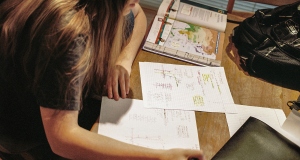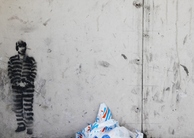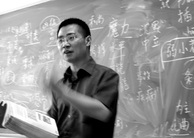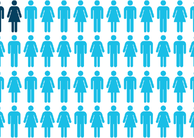Re-Envisioning Paulo Freire's "Banking Concept of Education"
By
2010, Vol. 2 No. 02 | pg. 1/1
KEYWORDS:
Paulo Freire was a Brazilian ideologist whose radical ideas have shaped the modern concept of and approaches to education. In his essay The 'Banking' Concept of Education, Freire passionately expounds on the mechanical flaw in the current system, and offers an approach that he believes medicates the learning-teaching disorder in the classroom. The flawed conception, Freire explains, is the oppressive “depositing” of information (hence the term 'banking') by teachers into their students. But, according to Freire, a “liberating” educational practice (his problem-posing method) negates the unconsciousness of those in classroom roles, and no false intellectual stimulation can exist within that practice. On the contrary, in any case, the student is responsible for understanding the material one way or another depending on what style the teacher adapts, even if the content is un-relatable to the students’ lives. If a teacher has a certain premeditated lesson, then there can be no true independence on behalf of the student, because both the banking and problem-posing concepts are anti-autonomous. The “banking concept,” as termed by Freire, is essentially an act that hinders the intellectual growth of students by turning them into, figuratively speaking, comatose “receptors” and “collectors” of information that have no real connection to their lives. Freire states:"Implicit in the banking concept is the assumption of a dichotomy between human beings and the world: a person is merely in the world, not with the world or with others; the individual is a spectator, not re-creator. In this view the person is not a conscious being (corpo consciente); he or she is rather the possessor of a consciousness: an empty “mind” passively open to the reception of deposits of reality from the world outside" (247). What Freire means by this is that the banking concept imposes a schism between a person (teacher and/or student) and the “real world”, resulting in the evident demise of his or her true consciousness, since the former can only be realized through the relationships and connections the individual draws from the material to their life. In this view, Freire claims that by assuming the roles of teachers as depositors and students as receptors, the banking concept thereby changes humans into objects. Humans (as objects) have no autonomy and therefore no ability to rationalize and conceptualize knowledge at a personal level. And because of this initial misunderstanding, the method itself is a system of oppression and control. To alleviate this “dehumanization” produced by the banking concept, Freire introduces what is deemed as “problem-posing education”. In this approach the roles of students and teachers become less structured, and both engage in acts of dialogic enrichment to effectively ascertain knowledge from each other. According to Freire, “Knowledge emerges only through invention and re-invention, through the restless, impatient, continuing, hopeful inquiry human beings pursue in the world, with the world, and with each other” (244). This means that true comprehension can only be fashioned though conversation, questioning, and sharing of one’s interpretations by all persons in the classroom. Within this concept Freire calls for an equal playing field, or what one of my former teachers called “mutual humanity”: “It [problem-posing education] enables teachers and students to become Subjects of the educational process by overcoming authoritarianism and an alienating intellectualism” (253-254). However, Freire failed to observe that incessantly within the apparatus of a classroom there is an imbalanced power structure between the teacher and the students. For all intents and purposes, the teacher is always an authority, no matter what. However, inherent in the problem-posing method is a two-pronged line of attack, meaning there are two classroom modes within the one problem-posing method. One is pseudo-dialectic, which is the illusion of students and teachers actually “discovering” knowledge with and from each other, because the teacher poses a question but already has the solution in mind. In this way, the students are directed towards a particular outcome, and do not have independent thought-processes. The other is genuine dialectic, meaning the teacher poses a question with no intention of steering the dialogue towards a single answer. Depending on the amount of experience the teacher has under their belt, they can expect a certain percentage of the possible answers, but it is the remaining percent of answers, which they had never actually considered, that they in fact take interest in. Freire asserted, “If it is true that thought has meaning only when generated by action upon the world, the subordination of students to teachers becomes impossible” (247). What this means is that passive “learning” thwarts true consciousness, which then means no active imagination can be produced in which action is facilitated. In view of the fact that “mock” problem-posing education does not necessitate agency on behalf of the students, then the method is, too, ineffective at facilitating consciousness that precedes reflection, which can therefore not be acted upon. Hence this method does not grant the students “liberation”, and their so-called independence is but an illusion. (Let it be known that for the sake of argument the ideas of “illusion” and “reality” are taken loosely to reflect the nature of different educational methods, not the nature of the ideas themselves). On the flipside, genuine problem-posing diminishes a teacher’s authority to a level that does not obstruct the exchange of ideas. Necessary participation, attendance, effort in assignments, and so on and so forth are indeed authoritative, however within the classroom dialogue there is a natural conversation that is not hindered by authoritativeness. At this point it is necessary to consider the nature of freedom: the difference between being free and being free of. True freedom is profound; can anyone ever truly be free? In this case of genuine problem-posing, the student is free of the oppression of limiting intellectualism inherent in banking and pseudo-dialectic. In essence, the Freirian spectrum- with “banking” at one end, pseudo “problem-posing” at the center (which essentially is a form of banking) and genuine “problem-posing” at the other end- mimics the real world in that one is always subject to some degree of authority. The dynamics of those relationships depend on how much each party is willing to give and take, meaning to what degrees the authority renounces their control and the subject allows them. The notion that students believe they are granted true independence in a classroom has consequences in and on the world at large. Illusory freedom is disastrous because it is a belief in something that is not truth- it does not exist. Therefore students become part of the “real world” believing they know all simply because they were under the impression they were free when they “learned” it. In reality, the students had never discovered what was true for them, and consequently were led to accept an idea and regard it as true without question. In the instance of true dialectic, the student regards the minimal authority as a non-threat, whereby the student then becomes the final authority on their convictions. In the real world, this is instrumental in fostering a society of enlightened, open-minded and independent persons. Freire elucidates: "In problem-posing education, people develop their power to perceive critically the way they exist in the world with which and in which they find themselves; they come to see the world not as a static reality, but as a reality in process, in transformation. Although the dialectical relations of women and men with the world exist independently of how these relations are perceived (or whether or not they are perceived at all), it is also true that the form of action they adopt is to a large extent a function of how they perceive themselves in the world. Hence, the teacher-student and the students-teachers reflect simultaneously on themselves and the world without dichotomizing this reflection from action, and thus establish an authentic form of thought and action" (252). What Freire means is that problem-posing is dynamic because, according to the text, reality is in a continuous state of change. He is saying that although the actual dialogue subsists whether or not the subjects recognize the true nature of reality, their actions are formed by their perceptions of their own reality. The revolutionary component of problem-posing is when both the teacher-student and student-teacher contemplate their own “realities” and are then empowered to imagine otherwise. Because of and through this imagination, the teacher-student and student-teacher act upon those considerations, and thus revolutionize the current reality and “advance humanity”. The authentic form of thought and action produced by genuine problem-posing is the key to human progression: by placing oneself in the timeline of humanity to learn from the past, examining one’s life in relation to the present while questioning everything, and moving onward to shape the future while never ceasing to idly negate those lessons. Education in the post-modern society has become the backbone, the foundation for the persons of that society that will one day hold the reigns. The future of humanity is closely linked to the individuals produced by education, and the methodological circumstances in which that intellectual transformation took place. Necessary to the future is an attention to the present in which we vow to set genuine, dialectical education as the bar to initiate advancement, and search for the rebirth of imagination. ReferencesFreire, Paulo. “The “Banking” Concept of Education.” Ways of Reading. 8th ed. Bartholomae, David and Anthony Petrosky. Boston: Bedford- St. Martin’s, 2008. 242-254. Print. Suggested Reading from Inquiries Journal
Inquiries Journal provides undergraduate and graduate students around the world a platform for the wide dissemination of academic work over a range of core disciplines. Representing the work of students from hundreds of institutions around the globe, Inquiries Journal's large database of academic articles is completely free. Learn more | Blog | Submit Latest in Education |


















